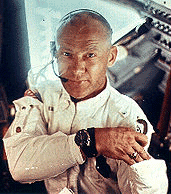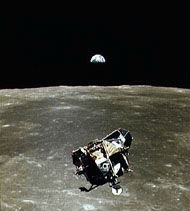
 |
| Buzz Aldrin inside the LM during Apollo 11 (NASA) |
 |
| The LM above the moon's surface (NASA) |
Lunar Landing
On the morning of July 20, 1969, Collins helps Armstrong and Aldrin through a tunnel into the tiny Eagle.Alone on Columbia, Collins worries about his friends. "You cats take it easy on the lunar surface," he tells them over the radio.
Armstrong and Aldrin fly face down, then flip over and see Earth — a quarter-million miles away. When they are just 12 minutes from landing, they fire the engines. Suddenly, lights flash in the cockpit. "Program alarm!" Armstrong barks. The computer is overloaded. Tense minutes pass while Mission Control decides if this alarm requires an abort. Mission Control says to keep going.
The Eagle flips over again and Armstrong and Aldrin face the Sea of Tranquility, the place they are supposed to land. The problem: it's a sea of rocks! Armstrong skims over boulders and flies over craters. Finally, he sees a clear spot. He has to come down exactly straight or risk breaking one of the Eagle's landing legs. They descend like an elevator. Only 20 seconds of fuel remain! Dust blows. Aldrin says, "Contact!"
"Houston, Tranquility Base here," Armstrong says. "The Eagle has landed!"



